
European Journal of Finance
Scope & Guideline
Connecting theory with practice in the world of finance.
Introduction
Aims and Scopes
- Financial Market Dynamics:
Explores the behavior of financial markets, including stock, bond, and cryptocurrency markets, with an emphasis on market efficiency, volatility, and investor sentiment. - Corporate Finance and Governance:
Covers topics related to corporate financial decision-making, governance structures, capital structure, and the impact of managerial behaviors on firm performance. - Risk Management and Financial Stability:
Examines systemic risks, regulatory frameworks, and the implications of financial crises on banking and investment practices, with a focus on enhancing financial stability. - Sustainability and ESG Considerations:
Investigates the integration of Environmental, Social, and Governance (ESG) factors into financial decision-making and the impact of sustainable finance on corporate performance. - FinTech Innovations:
Analyzes the influence of financial technology on traditional finance, including the role of digital currencies, peer-to-peer lending, and the impacts of innovation on financial inclusion. - Behavioral Finance:
Studies the psychological factors that influence investor behavior and decision-making processes, particularly in relation to market anomalies and sentiment.
Trending and Emerging
- Exploration of ESG and Sustainable Finance:
Research on how ESG factors impact investment decisions and corporate behavior is surging, reflecting a growing emphasis on sustainability within finance. - Behavioral Insights into Financial Decision-Making:
There is a notable trend towards examining behavioral finance, focusing on how psychological factors influence investor behavior and market dynamics. - Machine Learning and Big Data Applications:
The integration of machine learning and big data analytics in finance is rapidly gaining traction, with studies focusing on predictive modeling and risk assessment. - Impact of FinTech on Traditional Finance:
The disruption caused by FinTech innovations is a hot topic, with increasing research on how these technologies reshape lending, investment, and financial services. - Cryptocurrency and Digital Assets:
Research on cryptocurrency markets, including pricing mechanisms and regulatory impacts, is on the rise, reflecting the growing importance of digital assets in finance.
Declining or Waning
- Traditional Portfolio Management Techniques:
There has been a noticeable reduction in studies focused on conventional portfolio management strategies, as new methodologies and technologies, such as machine learning and AI, gain prominence. - Static Risk Assessment Models:
The reliance on static models for risk assessment is waning, with a shift towards dynamic and adaptive approaches that incorporate real-time data and market conditions. - Regional Financial Integration Studies:
Research examining regional financial integration, particularly within Europe, has decreased, possibly due to a growing focus on global financial systems and cross-border influences. - Conventional Economic Indicators:
The use of traditional economic indicators as primary measures of financial health is diminishing in favor of more innovative and comprehensive metrics that capture broader market sentiments. - Single-Factor Models in Asset Pricing:
Interest in single-factor asset pricing models is decreasing as researchers increasingly adopt multi-factor models that account for a wider range of influences on asset returns.
Similar Journals
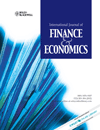
INTERNATIONAL JOURNAL OF FINANCE & ECONOMICS
Innovative Perspectives on Finance & EconomicsInternational Journal of Finance & Economics, published by Wiley, is a premier academic journal that serves as a vital resource for researchers and professionals in the fields of finance, accounting, and economics. With an impressive impact factor and a reputation for excellence, the journal is recognized in the 2023 Scopus rankings, placing in the top quartiles across multiple categories, including Q2 in Accounting, Economics, and Finance. The journal has been a significant contributor to academic discourse since its inception in 1996, with its converged years extending to 2024, thereby ensuring the continuous advancement of knowledge in these critical areas. Although it operates under a traditional subscription model, its comprehensive articles provide insightful analyses, empirical research, and theoretical advancements that cater to a diverse audience—from seasoned scholars to emerging students in the field.
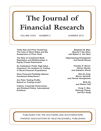
JOURNAL OF FINANCIAL RESEARCH
Unveiling Trends in Financial ResearchThe JOURNAL OF FINANCIAL RESEARCH, published by WILEY, stands as a pivotal platform for disseminating innovative research in the fields of finance and accounting since its inception in 1978. With an ISSN of 0270-2592 and an E-ISSN of 1475-6803, this journal aims to address contemporary challenges and trends within the financial research landscape. It has achieved notable recognition, being placed in the Q2 category for both Finance and Accounting in the 2023 rankings, signifying its relevance and impact within the academic community. Although it does not currently offer open access, the journal is accessible through various academic databases, catering to a diverse audience of researchers, professionals, and students keen on advancing their knowledge and understanding of financial systems and methodologies. With an evolving scope that encompasses empirical studies, theoretical frameworks, and practical applications, the JOURNAL OF FINANCIAL RESEARCH is committed to contributing valuable insights into the complexities of financial practices and policies.

International Journal of Managerial Finance
Connecting academia and practice in the world of finance.The International Journal of Managerial Finance is a leading academic journal published by Emerald Group Publishing Ltd, dedicated to advancing the field of finance through rigorous research and scholarly discourse. Its ISSN is 1743-9132, with an E-ISSN of 1758-6569. Since its inception in 2005, the journal has provided valuable insights and frameworks that bridge theory and practice in managerial finance, making it an essential resource for researchers, professionals, and students alike. With its current standing at Q2 in both Business, Management and Accounting and Finance categories for 2023, and impressive Scopus ranks that place it in the 70th and 68th percentiles respectively, the journal is recognized for its high-quality contributions to the field. Though it does not currently offer open access, the rigorous selection process ensures that published articles are of the highest academic standard, providing a platform for significant discussions around contemporary issues in finance and management. The International Journal of Managerial Finance continues to play a pivotal role in shaping the discourse within the financial sector, fostering knowledge that is instrumental for effective managerial decision-making.

International Journal of Financial Studies
Exploring the forefront of financial innovation.The International Journal of Financial Studies is a premier publication dedicated to advancing the field of finance through open-access research. Published by MDPI based in Switzerland, this journal offers researchers, professionals, and students a platform to disseminate their findings in an accessible format since its establishment in 2013. With its ISSN of 2227-7072 and a commendable impact reflected in its Q2 ranking in finance, it occupies an influential position among finance-related journals, as evidenced by its 65th percentile rank in Scopus. The journal encompasses a wide array of topics in finance, making it essential reading for those seeking to stay abreast of current research trends and methodologies. As an open-access journal, all articles are freely available, significantly enhancing the visibility and reach of published studies, which is crucial for fostering collaboration and innovation within the global financial community. Published continuously until 2024, the International Journal of Financial Studies is not just a source of knowledge; it is a critical contributor to the progression of financial scholarship.
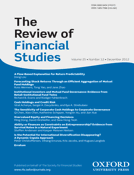
REVIEW OF FINANCIAL STUDIES
Driving Impactful Discoveries in Financial StudiesREVIEW OF FINANCIAL STUDIES, published by Oxford University Press Inc, stands as a premier academic journal in the realms of accounting, economics, and finance. With an impressive Impact Factor that reflects its high citation rates and broad influence, this journal, with an ISSN of 0893-9454 and E-ISSN 1465-7368, is considered a cornerstone for researchers, academics, and professionals seeking to contribute to and stay updated on groundbreaking developments in financial studies. Since its inception in 1996, it has established a robust reputation, consistently ranking in the Q1 category across multiple disciplines, highlighting its elite status in the global academic landscape. The Scopus rankings further reinforce its importance, positioning it at the forefront of business, economics, and finance research. While the journal is not open access, it offers vital insights and comprehensive studies that foster a deeper understanding of contemporary financial issues and methodologies. Located in the United Kingdom, the REVIEW OF FINANCIAL STUDIES is an essential resource for those aiming to advance their knowledge and research in this dynamic field.

Pacific-Basin Finance Journal
Connecting Research and Practice in Pacific FinancePacific-Basin Finance Journal is a prestigious academic journal that focuses on critical developments and innovative research within the fields of finance and economics, specifically tailored to the Pacific region's unique economic landscape. Published by Elsevier, the journal boasts an impressive impact factor and is categorized in the Q1 quartile for both Economics and Econometrics and Finance as of 2023. This indicates its high relevance and position among the top journals in its field, with Scopus rankings reflecting a strong standing in the competitive landscape of finance research, holding the 45th position out of 317 in Finance and the 108th in Econometrics. Established in 1993, the journal is committed to disseminating rigorous theoretical and empirical research findings that enhance the understanding of financial systems in the Pacific Basin. Although the journal is not open access, it provides invaluable insights and comprehensive studies aimed at professionals, researchers, and students alike, fostering a deeper comprehension of the region's economic dynamics and global interconnectedness.
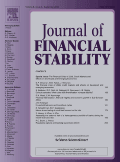
Journal of Financial Stability
Connecting scholars to the forefront of financial innovation.The Journal of Financial Stability, published by Elsevier Science Inc., is a renowned academic journal that serves as a premier platform for the dissemination of innovative research in the fields of finance, economics, and econometrics. With an ISSN of 1572-3089 and an E-ISSN of 1878-0962, this journal has established itself as a leader in its category, ranking Q1 for both Economics and Finance in the 2023 category quartiles. This positions it amongst the top 13% of journals in Economics and the top 35% in Finance, according to Scopus rankings. Covering a wide range of topics related to financial stability, the journal aims to fulfill its objective of advancing scholarly communication and providing researchers, professionals, and students with valuable insights into contemporary financial challenges and innovations. Operating from the Netherlands and converging from 2004 to 2024, the Journal of Financial Stability continues to contribute significantly to the academic landscape, inviting submissions that push the boundaries of knowledge and understanding in financial systems.
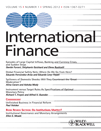
International Finance
Illuminating trends in global financial practices.International Finance is a prestigious academic journal published by WILEY, dedicated to the exploration and advancement of theories and practices in the realms of finance, development, and geography. With a strong emphasis on empirical and theoretical research, this journal provides a crucial platform for researchers, professionals, and students to disseminate cutting-edge findings that shape our understanding of the financial landscape on a global scale. Holding an impressive impact factor and categorized in the Q2 quartile across multiple disciplines, including Development, Finance, and Geography, the journal has established itself as a significant contributor to scholarly discourse. Since its inception in 1998 and spanning until 2024, International Finance offers a comprehensive overview of current trends and challenges faced in financial contexts, enhancing the decision-making processes within academia and industry alike. Although the journal is not open access, its rigorous peer-review process guarantees high-quality content that is indispensable for anyone engaged in the diverse fields intersecting with finance.
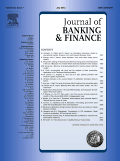
JOURNAL OF BANKING & FINANCE
Navigating the Complexities of Finance with ExpertiseWelcome to the Journal of Banking & Finance, a premier publication in the fields of finance and economics, expertly published by Elsevier. With its esteemed Q1 ranking in both the Economics and Econometrics and Finance categories for 2023, this journal frequently garners significant attention from researchers, professionals, and academics alike. Established in 1977, it has become a crucial resource for the latest research and advancements in banking and financial services, influencing policies and practices on a global scale. The journal's commitment to high-quality, peer-reviewed content ensures that it not only contributes to academic discourse but also drives real-world financial innovation. As part of the respected Elsevier publishing collection, the journal's rigorous standards and comprehensive analysis serve as indispensable tools for those seeking to understand and navigate the complexities of the financial landscape. Located in the Netherlands, the Journal of Banking & Finance continues to play a vital role in shaping the future of financial research through its impactful insights and research contributions.
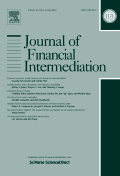
JOURNAL OF FINANCIAL INTERMEDIATION
Bridging theory and practice in finance.JOURNAL OF FINANCIAL INTERMEDIATION, published by Academic Press Inc Elsevier Science, is a premier academic journal dedicated to the study of financial intermediation. First established in 1990, this esteemed journal has firmly positioned itself within the top quartile (Q1) of rankings in both Economics and Econometrics as well as Finance, reflecting its significant impact and relevance in the field. With an impressive Scopus ranking of #31 out of 317 in Finance and #74 out of 716 in Economics and Econometrics, it caters to a diverse audience, including researchers, professionals, and students interested in the intricate dynamics of financial markets and institutions. While the journal does not currently offer open access, it remains a vital resource for disseminating cutting-edge research and insights that drive innovation and inform policy-making in the financial sector. With a commitment to maintaining high academic standards, the JOURNAL OF FINANCIAL INTERMEDIATION continues to serve as an essential platform for advancing knowledge in financial theories and practices.